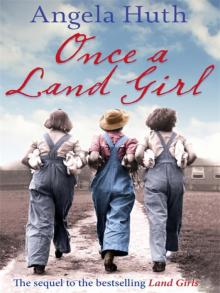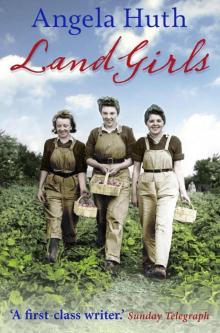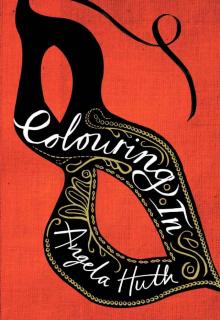- Home
- Angela Huth
Nowhere Girl Page 6
Nowhere Girl Read online
Page 6
In the afternoons I would go to a cinema, or feed the seagulls or have my hair done. Three evenings a week we would drive the yellow Ford Anglia to some local country pub for dinner. Sometimes, I would find a cottage near Portsmouth for Richard to contemplate. The hotel would make us up a box of fishpaste sandwiches and Penguin biscuits, and we would take a picnic to see it on a Sunday. But Richard was never tempted. The isolation or the unruly garden or the lack of heating depressed him. He preferred our hotel life.
When we came back to the hotel in the evenings, never later than ten thirty, it was always asleep. We would talk softly along the passages, and keep our voices low in our room. One night, after Richard had climbed back into his own bed again, he turned on the bedside light. The clock said midnight.
‘I want to talk to you,’ he said.
‘What about?’ I was sleepy, and unused to our routine being disturbed.
He leant on his elbow and did his pyjama jacket up to the neck. His ruffled hair stood straight up on his head, grey and stiff.
‘I can never forget you’re twenty years younger than me, little one, and there’s a whole – gap of experience between us.’ I thought of myself as a small rowing boat and him as an ocean liner. The rowing boat bounced hopelessly behind the liner, divided from it by a mile of churning sea. I giggled.
‘No, seriously,’ he said. ‘That’s what I think. And the thing is,’ he paused, ‘the thing is, an old sea dog like me isn’t likely to change his ways. There’s something I’ve been meaning to tell you ever since we were married. – I’m very ashamed of myself, but I must get it off my chest for once and for all.’ He undid his top pyjama button and did it up again. ‘Just before I came back from Barcelona to marry you, I was unfaithful to you. I had promised myself never to see Matilda again – but I did.’
I lay back on my pillow and he craned higher up on his elbow to see my face.
‘Oh,’ I said, ‘you mean the girl whose photograph is in your wallet?’
‘Now, don’t cry and get upset, darling,’ he said, extending a huge hand, with fingers outspread, towards me. ‘You must understand. I had to tell you.’
I asked about Matilda, and with relief he turned out the light.
‘You don’t mind, do you?’ he asked, and told me about her. She was thirty and divorced. Her skin was permanently suntanned and she smelt of tubor roses. She had black hair and kind eyes and three tom cats, and they had met in a night-club. She had a head like a rock, she cooked like a dream, and she wore tight silk trousers. We talked about her most of the night.
Every day for a week, after that night, Richard returned to lunch with me. We never mentioned Matilda. Instead, we made plans for some future day when we would have a house on the Solent, and three or four children. On the Sunday, Richard complained to the head waiter about the overcooked roast beef. He was not naturally a complainer, and seemed nervous.
On the eighth day he bought me twelve red roses wrapped in cellophane paper, and a box of liqueur chocolates. That evening I drove him down to the ship and waved good-bye. Duty forced him to return to Barcelona.
*
At five to eight Mrs Fox walked quietly into the room. In the subdued light, the dust of rain on her black coat made it glow like moleskin. Her hands were clenched at her side, gloveless.
‘Edith is dead,’ she said. ‘She died fourteen minutes ago.’
I stood up and she sat down.
‘Shall I get you some – tea, or brandy or anything?’
‘No, no. I’ll think about that later.’ She stared at the blank television set. I asked if I could help in any way.
‘No. You must go back to London. Joshua will be waiting for you. You have already done enough. I must stay here for a few days and arrange things.’ She spoke very quietly, with pauses in between each sentence. At a sign from her I turned on the television and we watched a commercial for Quick Brew tea. ‘I was thinking,’ she went on, ‘there might be a band down here, somewhere, who would care to play.… What do you think?’
‘There might be,’ I said, and she smiled. She stood up, came across to me and offered a clenched hand.
‘Now please go,’ she said, ‘and no arguing. I will be all right.’ She led me to the door, her hand taut but unquivering. As I left I heard her asking the receptionist for a room from which she could hear the sea.
*
Through the dark the lights crash on to the windscreen. Rosettes of blinding lights that split, multiply, divide and bloom again. The rain splinters the lights into a million petals that stay whole for a moment, then join into mean little channels and sneak down the glass. On another night like this Jonathan, driving in his fur-lined gloves, once said:
‘Darling, I must get one of those cloth covers for the steering wheel….’ Why should I remember that?
The noise of the engine, the wet black margin of night round the brilliant windscreen. Among the fractured headlights swim the dying Edith’s eyes, not quite burnt out. Was she frightened, or was she too tired to be frightened? Did the girl with the vermilion lips close the lids over her eyes when she died? Or was that the Matron’s prerogative?
I turn on the wireless. Bud Flanagan is crooning ‘Underneath the Arches’, and I smile to myself because if I did not smile I would almost cry. But at the end of this journey Joshua would be there with aspirin for the pain in my head, and a drink with ice in it which he would get quickly with no fuss, like a good actor does on the stage. I could have a bath and talk to him about his day, while he sat on the edge. Then he could take over the driving of the noisy car and we would go to a warm dark restaurant where candles and steaks and wine would crowd out Heme Bay and the ultra-black night. I accelerate. Doubly fast the lights crash on to the windscreen.
*
But Joshua was not in the flat. It was dark. The curtains were undrawn and the bed unmade. I threw myself on to the cold, rumpled bedclothes and shut my eyes. I had no energy to get up again.
It can only have been a few moments later, but it felt like several hours, that he came back. I could hear him in the next room, snapping on lights and flicking shut curtains. I didn’t call and he came in.
‘Are you asleep?’
‘No.’ I sat up. He put on the light.
‘You look exhausted. Was it awful?’
‘It was long.’
‘I’ve had a terrible day, too.’ He sat beside me on the bed and took off his glasses. ‘In the cutting-room. Most of the good bits are on the floor.’
‘I’m very hungry,’ I said. ‘Is there any food?’
‘Not a thing. There’s a coffee bar place where we could get an omelette downstairs. We’d better hurry, before it shuts.’
We drank neat vodka. Warmth began to ease out the empty tiredness and the room became as fluid as an underwater scene. In the lift Joshua held my hand. In return I leant against him, half for support.
The coffee bar was almost empty. We sat in a corner by the window at a Formica-topped table and I focused on the island of salt, pepper and tomato sauce in its middle. A waitress with a squint approached us.
‘There’s only omelettes left, you can have,’ she said, with some triumph.
‘We only want omelettes – they are the only thing in the world we want,’ said Joshua, ‘if you could give us the choice of everything, if you could set a banquet before us, all us would ask for is an omelette. Think of what you could tempt us with: whole sucking pigs turning on a spit –’
‘Sucking what?’ said the waitress, making a note on her pad.
‘Sucking pigs. And wild boar and linnets’ tongues, gulls’ eggs and boeuf en croute and caviar; fraises de bois soaked in champagne and tagliatelle verde; and crumpets and waffles with maple syrup and steak tartare and marrons glacés…’
‘That’ll be omelettes for two, then,’ said the waitress, and almost ran away. We laughed weakly and pushed the salt and pepper and tomato sauce away to hold hands again, and the grainy pattern of the Formica blurred like rain.<
br />
‘Do you invite lots of girls back to your flat – to stay?’ I asked.
‘Hundreds of thousands,’ said Joshua. ‘Why have you asked me to stay? How long can I stay for?’
‘I don’t know. The thing about you –’ He shrugged. ‘The thing with you, when you’re not there I don’t have to think about you very much. When you’re there, it’s so strong. I mean to-day, working, I didn’t think about you at all. Not till I was coming home. Then I remembered, and it was something nice to look forward to.’
‘Well, I thought about you,’ I said.
‘What did you think?’
‘It was while I was waiting in the hotel Mrs Fox sent me to while she waited for her sister to die. I just wanted you to be there very much. I tried to telephone you, but you weren’t there. It was a very dingy hotel with flowered calendars on the wall –’
‘It’s absolutely no use telling me,’ he said, ‘there’s never any use in telling someone how you felt about them when they weren’t there. Reported feelings don’t carry. They become embarrassing when you try to recount them. The emphasis gets all wrong. Maybe I’m just biased –’ he smiled, ‘but once I left someone at a station. – Stations are awful for making one feel: I must remember to tell her how I felt when she left. Anyhow, once the train was on its way I wrote her a long letter describing the gloom that came over me as she disappeared out of sight. I was only twenty and I posted it, I remember, at the first stop-Didcot. Of course, this girl completely misunderstood me. She wrote back and said she hadn’t realised the extent of my feelings, and she presumed that if I felt like that about her, I wanted to marry her. Silly idiot. I didn’t feel like that about her in general. I just felt like that about her when the train left. – That’s what I mean.’
‘There are whole areas about people you should never get to know about,’ I said, ‘however involved you are with them. Once I went out with a very sophisticated sort of man, something to do with films, who took me to the Caprice all the time and ordered Lobster Newburg for me without asking if I wanted it. He was very steely and rather frightening, and I would have done anything for him. Then one day he asked me, at the Caprice, if I knew of any good launderettes in the Cromwell Road. I said why, and he said because since he’d lost his housekeeper his dirty linen had been piling up and he didn’t know what to do about it. The thought of this glossy, important man wandering about the Cromwell Road with his bag of dirty socks, hopelessly looking for a launderette, was completely disillusioning. So disappointing that I never went out with him again. He shouldn’t have told me.’
‘It’s all the same sort of thing,’ said Joshua. The waitress brought our omelettes. She put two white, frothy coffees down on the table as well.
‘You didn’t mention them in the banquet,’ she said, her humour recovered, ‘but I thought I’d better get them before the machine man goes home.’ We laughed with her and ate hurriedly.
It was very late when we got back. We made the bed.
‘It seems as if I’ve been here ten years, not twenty-four hours,’ I said.
‘You must forget to-day quickly. It can’t have been much fun for you.’
‘In a way, it’s made it much better, getting back.’
When we went to bed, we curved into each other and slept at once.
Chapter Six
Joshua liked treacle and cream on his cereal for breakfast. He would pace round the room in his dressing-gown, holding the bowl, and stop to look out of the windows as he ate. In contrast to all the sweetness of the cereal, the other half of his breakfast was a large tin mug of sugarless black coffee. He would leave this on the low table and drink it when all the steam had gone and it was nearly cold.
It was a morning three or four weeks after Edith Smith’s death. I was lying on the floor at breakfast time selecting stories from the papers to read to him. He was wandering round me, as usual, making no comment. It was October now, and the early sky, as if it had absorbed something from the grey shimmer of London below it, was a sombre blue. Joshua stopped at the window and looked down.
‘The flower woman,’ he exclaimed. ‘She hasn’t been by for a month.’ He ran from the flat, still in his dressing-gown, no pyjamas beneath. I called after him but he didn’t reply. I looked out of the window but couldn’t see the flower woman he had seen.
He came back ten minutes later carrying a wooden box filled with pots of chrysanthemums. They were pink, gold, and deep wine red.
‘Look! I almost bought her out.’ He was ridiculously pleased. ‘Do you like them? Do you like chrysanthemums? Where shall I put them? – Wait, stay there. Stay on the floor.’ He knelt down, put the box on the floor, and began to take the pots of plants from it one by one. With them he made a barrier round me and the papers.
‘Child,’ I said.
‘Don’t you like them?’
‘Of course I do.’
‘Which colour best?’
‘Gold.’
‘So do I. Look, now you’re in a fortress. I can’t get you.
‘If I put my head on the floor you couldn’t even see me unless you knelt up and peered over. They’re so tall.’
‘I could crush down the barrier.’
‘Don’t spoil the flowers – ’
‘To hell with the flowers – ’. He parted several plants with the quick gesture of someone pulling back curtains and they scattered on the floor. They fell on their sides. Thin green stalks snapped, leaves bent, and crumbs of earth trickled from the cheap plastic pots.
‘Joshua!’ The papers crackled beneath us.
‘Darling.’ It was the first time he had ever said that. We lay in the middle of the ruined fortress of flowers. The plants that still stood were tall as trees, their petals bright balloons against the white walls of the room.
‘Say that again,’ I said.
‘Darling, darling, darling. There you are.’
‘Why haven’t you ever said it before?’
‘You always ask silly questions.’
‘Joshua?–’
‘Be quiet.’ I was, for a moment.
‘Joshua. You know what? I haven’t thought about Jonathan, or being married, for about two weeks now. What must that mean?’
‘That something has made you think about him now. What?’
‘I don’t know. I suppose just that we never used to have breakfast like this. He liked everything neatly laid on the dining-room table. Boneless kippers were his favourite food. Typical. He thought acts like boning fish were a waste of his time.’
Joshua pulled himself up on one elbow and took the cup of cold coffee from the low table.
‘Did you ever make love after breakfast?’
‘Not if he was already dressed. Sometimes he thought about it – I could tell the evening before, and he went about with a funny sort of smile so I knew that he was planning it all elaborately. He would come down to breakfast in his dressing-gown, and his pyjama tops undone so that I could see the St Christopher on his chest. The only thing was, he had shaved, so the uncalculated look was rather spoiled. When he got to about the toast and marmalade he would suggest that we went back to bed to sleep for an hour. He could never just say: let’s go and make love. And if I hadn’t realised about his plan, and had dressed, myself, he wouldn’t say a thing – He could never bear to ask me to undress.’
Joshua lay back on the papers again.
‘You know something nice?’ he said quietly, shutting his eyes ‘The film is nearly finished. And I thought when it was quite finished I might take you away somewhere for a few days.’ He pulled my head on to his chest. His dressing-gown smelt of damp corn.
‘Where would we go? France? No, I hate France. Please not there. Italy would be lovely. I could show you Florence or Rome. I know all those hills near Florence – I know farmhouses where you can just drop in and they fry you plates of bacon – Or we could try Spain, perhaps, or Corfu. Corfu’s like Gloucestershire in the summer.’
‘None of those places, baby,’
he said.
‘Where, then?’
‘Norfolk.’
‘Norfolk?’
‘It’s marvellous.’
‘I don’t know it.’
‘You will. You’ll like it.’
‘But the weather?’
‘It’ll be rather dank, and quite cold in the evenings. I have a small boat up there. We’ll take her out to the island and have picnic lunches. You could build a fire, even.’ I could see him smiling to himself, his eyes still shut.
‘A fire? Me? Won’t it be too cold for outdoor cooking? How will we go? In the car?’
‘My darling.’ He sat up now and dragged me with him. ‘You have an ad-type mind. I can see you imagining us in the red car, open, hair streaming in the wind … petrol people. The car is going to be repaired.’
I hit him and squealed. He flung me back on to the floor again.
‘We’re going by train,’ he said, and the last of the flowers fell over.
We did go by train, a few days later. At the station Joshua did things quite differently from Jonathan. Jonathan always made a great show of organising the luggage, even if it was only two cases. He told the porter the time of the train two or three times. He told him which cases to put on which part of the luggage rack, then rubbed the coins noisily together before tipping the man with an air of great benevolence. Joshua’s way was to carry all four cases himself and to discourage any helpful-looking porter with a scowl.

 Sun Child
Sun Child South of the Lights
South of the Lights Virginia Fly is Drowning
Virginia Fly is Drowning Of Love and Slaughter
Of Love and Slaughter Such Visitors
Such Visitors Once a Land Girl
Once a Land Girl Land Girls
Land Girls Colouring In
Colouring In Nowhere Girl
Nowhere Girl Monday Lunch in Fairyland and Other Stories
Monday Lunch in Fairyland and Other Stories Another Kind of Cinderella and Other Stories
Another Kind of Cinderella and Other Stories Invitation to the Married Life
Invitation to the Married Life Easy Silence
Easy Silence